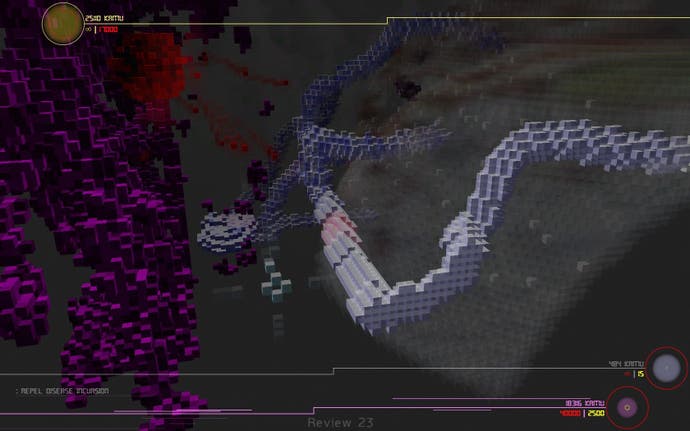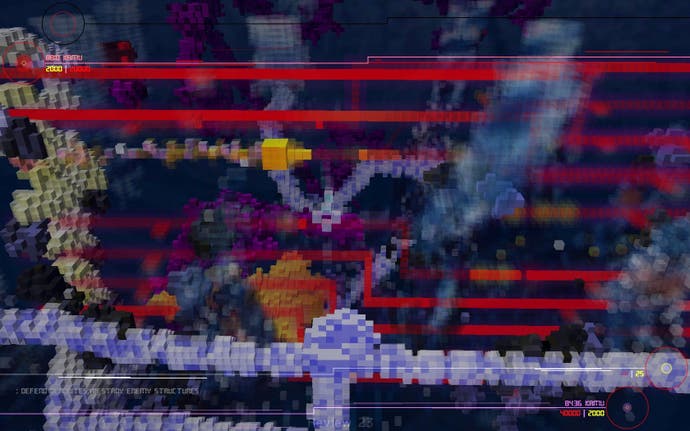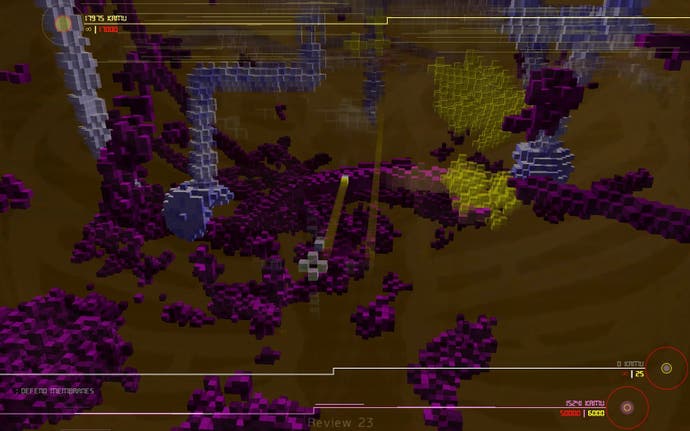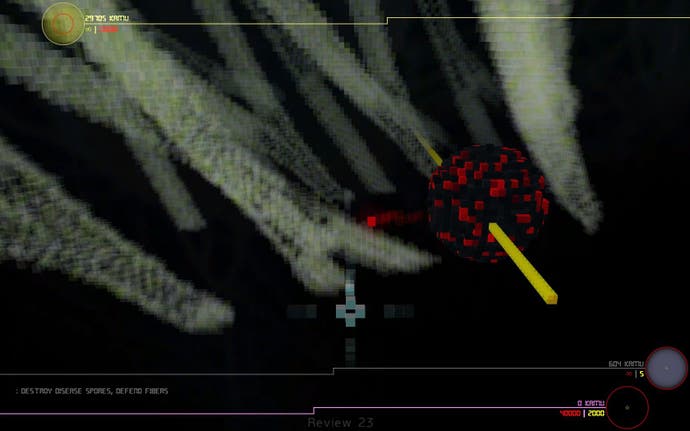Cell: Emergence Review
Going viral.
You're in trouble. A sheet of precious tissue was contaminated while your back was turned and the empurpled infection is spreading like biological wildfire. In a heartbeat, you've whipped your tiny nanobot into attack position and are lancing the stuff. One, two, three clicks of the mouse see the infection dissolving into a jaundiced yellow goo, leaving a gaping hole where flesh once was. You're panicking now, searching the infection site for traces and acutely aware of all the catastrophes that may be happening outside your camera's tragically human limits. The South American girl you're inside makes a mournful, booming noise. She is crying.
Dr. Mario never had days like this.
Welcome to Cell: Emergence, an indie game for PC and Xbox Live about battling disease on a nano scale in an environment that's destructible, but also capable of rampant growth. Terrifying growth. These are just a few interesting things about it.
Another is that it was designed and coded by Sheldon Pacotti, "principal" writer of the first two Deus Ex games, and yet another is that a close bedfellow would be 2008's chunk of Jeff Minter psychadelia Space Giraffe, of all things. Both of these games offer abstract arcade action where obfuscated visuals, goals and rules aren't a design flaw but rather part of the fun. The confusing world is a cryptic puzzle for you to absorb slowly, attempted solutions creeping into your initially reactive play.

And I do mean puzzle. Each of Cell: Emergence's 17 levels introduces a new moving part or re-arranges the existing ones to pull the rug out from under you with frightening force, like some tie-chewingly mad father figure determined to toughen you up. Without wanting to spoil anything, learning to blast the disease with your laser is only your first lesson, and while you'll still only be passably competent at using it by the end of the game (which should take you a little under four hours), it'll only be because you have so much other stuff on your mind.
The first example of which would be just steering your nanobot, which slips and shunts around the game's sanguine arenas with the agility of a gecko. You can weave freely around a flat plane, pouring firepower towards all you survey, but you can also snap around to any of the six different faces of the cuboid level and even rotate the camera when on the floor or ceiling.
This is all super useful. Or it would be if it weren't every bit as tricky as it sounds. It's all too easy to lurch from a wall to the floor instead of the ceiling, at which point your sense of direction will start making excuses and you'll be left to drunkenly orbit a vein packed with infection like the world's worst cannelloni dinner.
But you'll get the hang of this, and you'll be quietly enjoying shredding the ominious purple menance when, some 30 minutes in, Cell: Emergence will introduce the ability to leave strings of thick, glutinous "buckyfiber" in your wake. And if you're anything like me, you'll start getting very excited indeed as the direction this game is going in begins to take shape.

You're not the only part of the immune system working to stop this body from being devoured. You'll often encounter large cells that produce antibodies, and by threading buckyfiber between these factories and the tissue you're trying to protect, antibodies will travel along your fiber and, agonisingly slowly, flood the tissue, repelling any nasty incursions with happy ferocity.
Suddenly you're not just a marksman but a general, dispatching forces left and right, watching the supply lines and zooming around with the game's powerful controls to spot and snuff out potentially horrific biological attacks before they kick in. Even more awesomely, as failure turns from an abrupt, nasty surprise (with an ominous robot informing you that you've been "DELETED" in fine arcade fashion) into something you learn to see coming, you'll realise that on most levels, you're teetering on the very edge of failure for minutes on end. The afterglow of completing these levels is an excellent thing, a hot cocktail that sees you feeling smart, relieved and excited to see what's coming next. Suddenly, you're having a phenomenal time.
And then, just as suddenly, you're not. In an eccentric eschewing of traditional design, about halfway through its missions Cell: Emergence stops emerging quite so happily. Rather than the missions continuing to grow in complexity and colour, each level forcing you to use everything you learned before, this ecosystem you're getting to grips with starts becoming sparser, or its rules shift slightly making for an underwhelming final third instead of the rich, complex endgame that I was dreaming about.

You'll also encounter a couple of levels where the game drops the ball when it comes to hinting at what you have to do - and the analogous ball is held over a latrine. To attempt a mission only to be languorously spanked over seven minutes because you're not sure what you're meant to do is horrible, and while you'll almost always die with a tighter grasp of the level's rules (even if it's just because you crossed out possible solutions), you'll also find the game's spartan script to be occasionally misleading.
Sometimes, you'll be trying to destroy something indestructible when a level's solution is actually to party like it's 1982 and shoot the virus for the duration, just like you did on the first few levels. Let us know when we're expected to think laterally, and when we're not! Anything else is frustrating.
Speaking of the script, if Cell: Emergence's level design is a little lost at times, its plot sashays around with the striking confidence and incompetence of a drunk navigating a foreign city centre. Comics between missions show doctors bellowing doctory things at one another ("Give it another burst!" "Another mutation detected!"), but none of the panels link into a coherent whole. It's as if half the story was excised in some amateur surgery at the last second. All told, it's absolutely nothing that gets in the way of that heavy, hazardous action, but potential buyers working on the basis of Mr. Pacotti's work on Deus Ex are going to be baffled and angry.

In total, Cell: Emergence is a deeply odd organism. A fascinating concept, weirdly executed, with no padding whatsoever and a story that manages to be the single strangest thing in the game by its very mundanity. All of which makes it a beautiful curio, but difficult to recommend as a shooter.
Never mind that level design. By far the most frustrating aspect of Cell is that the game's tech and ideas only rarely make the leap, hand-in-hand, to become all this game can be. As with so many gaming oddities, Cell is haunted by the ghost of the game it could have been. Though, unlike so many of them, Cell barely ever lets you get bored. The screen's always bursting with poison voxels, the world s always a little bit of a mystery.
And, credit where credit's due, the game runs smooth as butter, devoid of errors or crashes. Pacotti has saved games journalism from a single buggy game joke.
Except that one.

